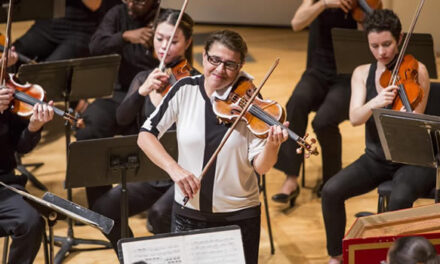More than a survey of 20th century music for the saxophone, Susan Fancher, saxophone, and Jane Hawkins, piano, distinguished faculty members of the Duke University Department of Music, brought to us an evening of poetry and music that surpassed my expectations. The recital took place in the Nelson Music Room on the East Duke University Campus. Anyone who attended will surely concur with me that this was one of the finest performances for saxophone and piano one could imagine; a youngster who listened from the front row is testimony that this was, indeed, special. Whether it was the Sonata No. 3 in A by J.S. Bach (transcribed by Fancher), Hilary Tann, Francis Poulenc (transcribed by Steve Mauk), the famous Hindemith Sonate (transcribed by Schott and Co.), or the witty piece by Milhaud, Scaramouche, there was a palpable eruption of beauty.
Fancher and Hawkins, both busy world-class performers, are known for their individual contributions to the music scene in the Triangle. Fluent in the language spanning early baroque to contemporary works, they are both advocates for new music. Together they projected amazing chemistry.
Beginning with her own transcription into B Major of Bach’s Sonata for Flute in A Major (S.1032, 1717), Fancher displayed a warm, delicious tone while at the same time honoring baroque performance practice. I thought this was a brave programming move considering the huge difference in timbre between the period instrument and modern soprano sax, but it worked beautifully, and part of this was Hawkins’ fine work on the piano. They played with delicate balance and poise — truly, it was exquisite.
Though I loved everything they played, including Paul Hindemith’s 1943 Sonate, meant for alto horn, and its accompanying dialogue (“The Posthorn”), it was Poulenc’s 1962 Sonata for oboe and piano that was the recital’s most expressive work. It was written in memory of his dear friend Sergei Prokofiev and transcribed for soprano saxophone by Steve Mauk. Understanding the emotional turmoil upon Prokofiev’s return to Russia after leaving behind a life in Paris, Poulenc poured his heart into the piece. The first of three movements, “Élégie” sings like a love poem. Fancher faithfully held the long sustained melodic lines with amazing breath control, yielding gorgeous tone throughout. The second movement, Scherzo, seems like coded political sarcasm, not surprising from a member of Les Six — the post-Debussyian, avant-garde collective of composers living in Paris. Perhaps influenced by Poulenc’s spiritual enlightenment, the last movement, “Déploration” is like a dream. Enhanced by the intimacy of the space, Fancher’s musical interpretation and feelings were revealed on her face.
Fancher also played the captivating “Windhover” (1985) for solo soprano saxophone by Welsh composer Hilary Tann (b.1947). Like an avian conversation, one hears two distinct voices. The piece brings to mind the busy chatter outside my window I hear on these spring mornings. But Tann’s voice is fresh and clearly distinct from her British predecessors, including Vaughn-Williams.
For dessert, we were treated to Darius Milhaud’s brilliant “Scaramouche, a cabaret piece he wrote for alto saxophone and small orchestra.” (Fancher’s notes) This left us all smiling.











